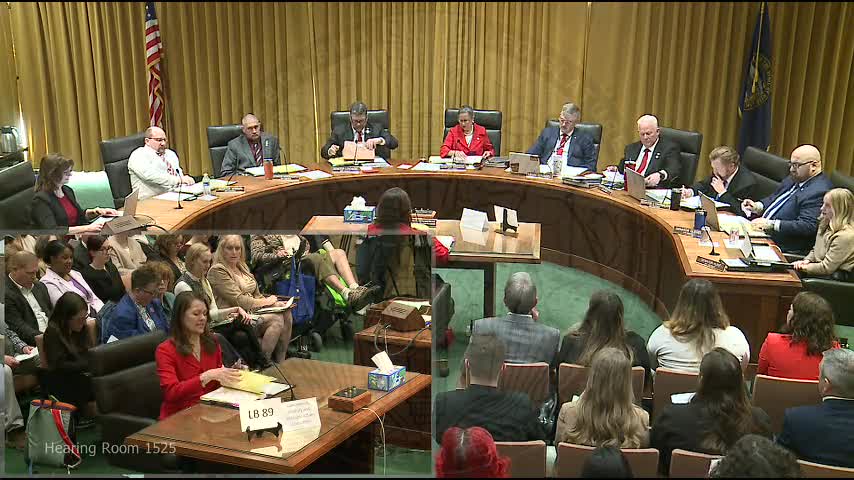Nebraska hearing draws hours of testimony over LB 89, ‘Stand With Women Act’
Get AI-powered insights, summaries, and transcripts
Subscribe
Summary
A public hearing in Lincoln stretched for hours as the Government, Military and Veterans Affairs Committee took testimony on LB 89, the so-called Stand With Women Act, a proposal that would define a person’s sex in law by reproductive system and require restrooms and locker rooms in schools and many state settings to be designated by that standard.
A public hearing in Lincoln stretched for hours as the Government, Military and Veterans Affairs Committee took testimony on LB 89, the so-called Stand With Women Act, a proposal that would define a person’s sex in law by reproductive system and require restrooms and locker rooms in schools and many state settings to be designated by that standard.
The bill’s introducer, Senator Kathleen Kauth, told the committee the measure “aims to protect the integrity of athletic competitions and ensure the safety and privacy of women and girls in schools and state agencies. This is not a political issue.” She urged the panel to advance the measure with amendments supporters say will clarify implementation.
Supporters who testified included athletes and medical and sports-science witnesses who argued biological differences matter in competitive athletics. “There are important biological differences between males, meaning boys and men, and females, meaning girls and women,” said Dr. Greg Brown, an exercise physiologist who testified for the bill. He told the committee such differences “give males inherent biologically based athletic advantages when compared to similarly aged, trained, and talented females at all ages and all levels of sports.” Governor Jim Pillen also urged passage, saying the bill “hits on 2 important priorities, our Nebraska values in providing necessary protections for our kids.”
Proponents pressed two arguments repeatedly at the hearing: that sports should remain separated so female competitors are not at a competitive or safety disadvantage, and that some intimate spaces should be reserved by sex so users have privacy. A number of proponents offered personal accounts. Former Connecticut high school runner Selena Soule told the committee that in her four years of high school she “was forced to compete against 2 males identifying as girls” and said she and other girls lost opportunities and scholarships.
Opponents — including civil-rights groups, medical organizations, school officials, and dozens of parents, teachers and students — said the bill is discriminatory, risks practical and legal problems and would harm the mental and physical health of transgender Nebraskans. “LB 89 is not 1 of those policies,” said Dr. Erin Feichtinger of the Women’s Fund of Omaha, arguing the bill “would increase surveillance of everyone’s bodies” and “make all people less safe, especially LGBTQ plus people who will be unable to access facilities safely.” Opponents also noted the Nebraska State Activities Association already has a transgender-participation policy and said the measure duplicates or contradicts existing rules.
Committee members and attorneys pressed supporters and opponents on enforcement and legal questions. Several senators asked how schools and state agencies would implement designations and what would happen if a visitor or student was accused of being in a restroom or locker room “of the wrong sex.” Supporters said schools would adopt policies and could designate single-stall or family restrooms; opponents warned the lack of a detailed enforcement plan could invite invasive scrutiny or harassment. Lawmakers also raised questions about private schools, the University of Nebraska and whether the bill would require state agencies to change administrative rules across many programs.
Much of the hearing included personal testimony. Among the array of witnesses were advocates from Alliance Defending Freedom and the Nebraska Family Alliance, coaches and former athletes who described safety concerns, and medical and mental-health professionals who warned that exclusionary laws correlate with higher rates of depression and suicidal ideation among transgender youth. Witnesses on both sides urged colleagues to read the research and the NSAA policy packets included in the hearing materials.
No committee vote was taken at the hearing. Senator Kauth signaled she was willing to work on clarifying language and enforcement details while reiterating the bill’s stated goal of protecting female athletes’ competitive opportunities and privacy in intimate spaces. Several senators said they wanted more time to study testimony and suggested any implementation language should be refined before the bill reaches a floor debate.
The hearing drew long lines of speakers and packed the hearing room with people who stayed late into the evening. Written position statements submitted to the record also reflected wide interest: several hundred proponents and more than 1,500 written opponents were listed in the clerk’s tally attached to the hearing record.
What’s next: The committee has not scheduled a vote. Members indicated they will continue to receive materials and consider amendments before deciding whether to advance LB 89. Given the volume of oral and written testimony and the legal questions raised at the hearing — including how the measure would interact with federal law and existing school and university policies — committee staff said more time is likely to be needed to draft workable implementation language.
